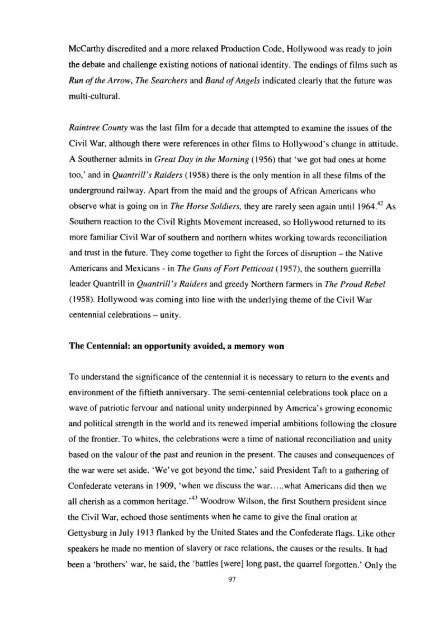Download (3483kB) - Greenwich Academic Literature Archive ...
Download (3483kB) - Greenwich Academic Literature Archive ...
Download (3483kB) - Greenwich Academic Literature Archive ...
- No tags were found...
Create successful ePaper yourself
Turn your PDF publications into a flip-book with our unique Google optimized e-Paper software.
McCarthy discredited and a more relaxed Production Code, Hollywood was ready to jointhe debate and challenge existing notions of national identity. The endings of films such asRun of the Arrow, The Searchers and Band of Angels indicated clearly that the future wasmulti-cultural.Raintree County was the last film for a decade that attempted to examine the issues of theCivil War, although there were references in other films to Hollywood's change in attitude.A Southerner admits in Great Day in the Morning (1956) that 'we got bad ones at hometoo,' and in QuantriWs Raiders (1958) there is the only mention in all these films of theunderground railway. Apart from the maid and the groups of African Americans whoobserve what is going on in The Horse Soldiers, they are rarely seen again until 1964.42 AsSouthern reaction to the Civil Rights Movement increased, so Hollywood returned to itsmore familiar Civil War of southern and northern whites working towards reconciliationand trust in the future. They come together to fight the forces of disruption - the NativeAmericans and Mexicans - in The Guns of Fort Petticoat (1957), the southern guerrillaleader Quantrill in QuantriWs Raiders and greedy Northern farmers in The Proud Rebel(1958). Hollywood was coming into line with the underlying theme of the Civil Warcentennial celebrations - unity.To understand the significance of the centennial it is necessary to return to the events andenvironment of the fiftieth anniversary. The semi-centennial celebrations took place on awave of patriotic fervour and national unity underpinned by America's growing economicand political strength in the world and its renewed imperial ambitions following the closureof the frontier. To whites, the celebrations were a time of national reconciliation and unitybased on the valour of the past and reunion in the present. The causes and consequences ofthe war were set aside. 'We've got beyond the time,' said President Taft to a gathering ofConfederate veterans in 1909, 'when we discuss the war.....what Americans did then weall cherish as a common heritage.' 43 Woodrow Wilson, the first Southern president sincethe Civil War, echoed those sentiments when he came to give the final oration atGettysburg in July 1913 flanked by the United States and the Confederate flags. Like otherspeakers he made no mention of slavery or race relations, the causes or the results. It hadbeen a 'brothers' war, he said, the 'battles [were] long past, the quarrel forgotten.' Only the97
















